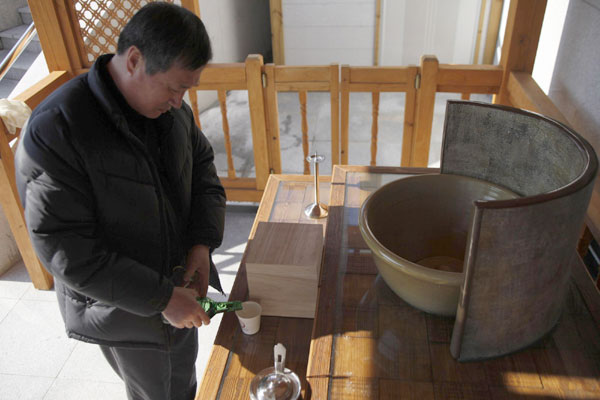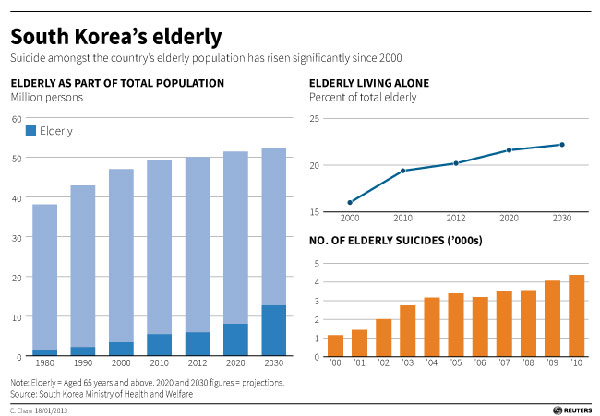S. Koreans face lonely deaths as traditions fade
Updated: 2013-01-21 14:27
(Agencies)
|
||||||||
SEOUL - When South Korean widow Yoon Sook-hee, 62, died after a bout of pneumonia in mid-January, she joined a growing number of old people in this Asian country who die alone and was cremated only thanks to the charity of people who never knew her.
Once a country where filial duty and a strong Confucian tradition saw parents revered, modern day South Korea, with a population of 50 million, has grown economically richer, but family ties have fragmented. Nowadays 1.2 million elderly South Koreans, just over 20 percent of the elderly population, live - and increasingly die - alone.
 |
|
Kang Bong-hee, representative of a federation of funeral directors that manages funerals free of charge for people who are unable to afford their own, pours a drink just before he buries the funeral ashes of Yoon Sook-hee together with the ashes of people without family or friends, at a cemetery in Daegu, about 300 km (189 miles) southeast of Seoul January 11, 2013. Once a country where filial duty and a strong Confucian tradition saw parents revered, modern day South Korea, with a population of 50 million, has grown economically richer but family ties have fragmented. Nowadays 1.2 million elderly South Koreans live - and increasingly die - alone, just over 20 percent of the elderly population. Picture taken January 11, 2013.[Photo/Agencies] |
Yoon's former husband, whom she divorced 40 years ago, relinquished responsibility after being contacted by the hospital and told of her death. Her only son was unreachable as he had long broken off all contact with his parents.
"There are many elderly people who are incredibly depressed because they don't have a place to put their bodies after they die," said Kang Bong-hee, representative of a federation of funeral directors that manages funerals free of charge for those who are unable to afford their own.
"They collect what little money they have and they come and ask us what to do (with their bodies) after they die."
Kang was one of the volunteers who put together a makeshift funeral for Yoon, with most of the funds coming out of his own pocket.
 |
South Korea is ageing at the fastest pace of all industrial nations, with the proportion of elderly rising to 11.8 percent of the population in 2012, up from 7.2 percent in 2002 and just 3.8 percent in 1980.
A report from the Welfare Ministry published in May last year predicted the ratio would grow to 15.7 percent in 2020 and to 24.3 percent in 2030, thanks to a declining birthrate that has dropped from six per woman of childbearing age to just one.
- Hong Kong elderly go north for retirement
- Elderly man rejected by son
- Internet users call for more help for elderly
- Confucianism books to be translated into 9 foreign languages
- DPRK premier visits Confucian temple in E China
- World Confucian Conference opens first session in China
- Confucianism -- teachings of Confucius

 Li Na on Time cover, makes influential 100 list
Li Na on Time cover, makes influential 100 list
 FBI releases photos of 2 Boston bombings suspects
FBI releases photos of 2 Boston bombings suspects
 World's wackiest hairstyles
World's wackiest hairstyles
 Sandstorms strike Northwest China
Sandstorms strike Northwest China
 Never-seen photos of Madonna on display
Never-seen photos of Madonna on display
 H7N9 outbreak linked to waterfowl migration
H7N9 outbreak linked to waterfowl migration
 Dozens feared dead in Texas plant blast
Dozens feared dead in Texas plant blast
 Venezuelan court rules out manual votes counting
Venezuelan court rules out manual votes counting
Most Viewed
Editor's Picks

|

|

|

|

|

|
Today's Top News
Boston bombing suspect reported cornered on boat
7.0-magnitude quake hits Sichuan
Cross-talk artist helps to spread the word
'Green' awareness levels drop in Beijing
Palace Museum spruces up
First couple on Time's list of most influential
H7N9 flu transmission studied
Trading channels 'need to broaden'
US Weekly

|

|







